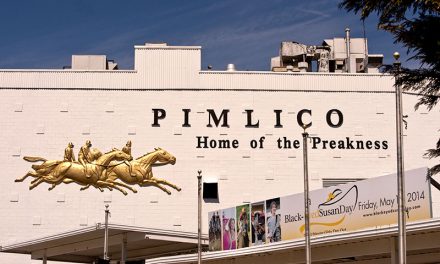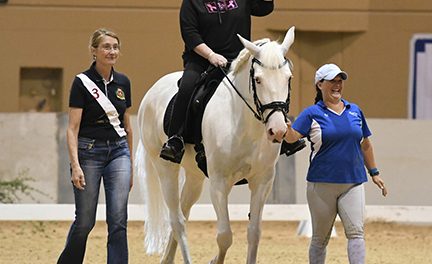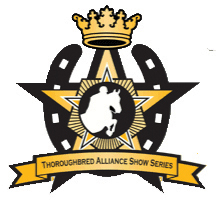Submitted by MHC Business Networking Co-Chair Crystal Brumme Pickett
Over 50 people registered for the MHC’s most recent Business Networking event, a Barn Fire Prevention Seminar on Tuesday, July 16, featuring professional first responders who are also horse people, as well as one of the equestrian community’s foremost architects. The seminar kicked off with a “green” hay stacking contest, led by lifelong hay farmer Howie Feaga (who owns Merry Acres horse farm) and horseman and fireman Dave Stull, testing participants’ knowledge of the curing process and spontaneous combustion.
Back inside the air-conditioned social hall of the Lisbon Volunteer Fire Department, Dave Stull, also a licensed electrician, proceeded to give participants a crash course in the hows and whys of barn wiring. Rumor has it that, after the seminar, the local farm stores were immediately sold out of agricultural-rated stall fans, as everyone present pledged to ditch their under-wired, fire-hazard box fans! In addition to learning about appropriate vs. inappropriate wiring and conduit, arcing and more, participants were also updated on how some of the new lighting technology could lower risks. Did you know that using an electric plug as an on/off switch is a BAD idea? This is something you can be advised about from a professional, like saltle.com/electrician-texas-service-areas/hudson-bend-electric-services/, as the plug’s prongs can become worn over time and can be a source of arcing. Another way you can help keep your barn and business safe from fire installing fire safety inspection software. This will help owners make sure their equipment is working properly in case of a fire. For more information, you can visit the Inspect Point LinkedIn page or a similar company and ask how they can help your business.
Next up was Nicole Ehrentraut, founder of Da Vinci Equine Emergency, and a Technical Large Animal Emergency Rescue Specialist & Equine Behavior Specialist who consults for a variety of Maryland fire departments. Nicole provided a mini-crash course in best management practices. She captured everyone’s attention by describing how rapidly a fire can consume a barn. It was devastating to hear. Put simply, a fire in this type of environment, and one that has been built with flammable materials, can spread quickly, which is why so many industry professionals may look at something like these steel buildings for sale to see how this type of building can provide them, and their livestock, with better fire protection safety going forward. Whilst this is a good idea, it may not be suitable for everyone, which is why they need to learn how to prevent a fire, as well as putting one out, so they aren’t faced with the potential consequences. Participants received tips on everything from the type and location of fire extinguishers, to establishing holding pens, to how to create an emergency evacuation plan by analyzing a barn’s entrance/exit points. She recommended providing the local fire department with basic diagrams that include these locations plus locations of water, electrical cutoff switches, hazards (such as fuel tanks) and other critical buildings. It was suggested that this information could be placed in a box labeled “First Responder Info” somewhere near the entrance to the property. She urged barn owners and managers to make sure all stalled horses were accustomed to entering and exiting the barn through every available opening. She encouraged barn owners to invite local fire departments to visit their farms, to see the layout of the property and what challenges they might face in fighting a fire. This is important, as many fires occur at night. It’s also a great opportunity to make sure your horses will allow themselves to be approached by a firefighter in full regalia. Nicole distributed a terrific, multi-page “Emergency Planning Workbook” to each attendee.
Standing in for Lisbon Fire Chief and horse farm owner Carey McIntosh was Deputy Chief John Vogts. In a kind yet blunt manner, Deputy Chief Vogt explained that the fire department is not there to save horses. They will do the best they can if it is possible to enter the burning building safely, but many barns will be fully involved and in danger of collapse within three minutes. The primary responsibility of first responders is to save human lives. The next responsibility is to mitigate damage and to keep the fire from spreading to other buildings. Therefore, a practiced evacuation plan that can be safely executed as soon as the fire is discovered by those on the property is essential.
John Blackburn, founder of Blackburn Architects, is internationally recognized for designing sustainable equestrian facilities – from small barns to complex equestrian centers – that are healthy and safe for the horses, that function well for the owners and riders, and that are cost effective using green technologies. Whether renovating or updating a barn or building a new barn, he provided sage advice for improving equine safety. He discussed layouts that gave several options for fast evacuation. Another suggestion was siting buildings to make sure that firefighting equipment can reach them easily and get close enough to both the buildings and adequate water sources.
This seminar was a goldmine of information – some that we have heard before and put on our “when we get around to it” lists, and some that was new and eye-opening. Here are just a couple more tidbits gleaned during the day.
- Put on a heavy oven mitt (it’s similar to a firefighter’s glove) and see if you can open your barn doors and stall latches. If not – replace them.
- Put reflectors on/near door latches (many fires are at night). Additionally, if you are concerned about the safety of any doors, you might also want to contact a team of fire door installation specialists for some expert advice. Some things are best left to the professionals, and fire safety is no exception in this respect.
Lunch was sponsored by The Tracy Diamond Team with EXP Realtors, and by CR Hogendorp, owner of Farm Family/Hogendorp Insurance Advisors and Cradlepine Farm in Frederick County. CR gave a brief presentation explaining how farms are evaluated for risks (such as, but not limited to, fires) and how that will affect the premiums paid by barn owners.
MHC general sponsor Mid-Atlantic Farm Credit was represented by Keith Wills, who explained that Farm Credit will work with horse farm owners for loans to update and improve the safety of their barns and facilities, which could possibly then lower insurance premiums.
Many thanks to everyone who donated door prizes, including Beltsville Construction Supply (fire extinguishers, and we learned that some were too small for use in a barn, but useful in horse trailers), FreeStyle Marketing (a real stall fan), John Blackburn (his fabulous book of “Healthy Stables by Design”), Emge Equine (a nice wall mounted bandage rack), Farm Family & Mid-Atlantic Farm Credit.
As a result of this seminar, look soon for an MHC Handbook (to be available in print and digital formats) for Barn Fire Prevention – Best Management Practices. MHC has received numerous requests to repeat this seminar in other locations around Maryland, and the committee is currently working on a format to do so. Farm or Business members who are interested in hosting a Barn Fire Prevention Seminar (at either their location or at a local fire hall) should contact MHC Executive Director Carrie Hull.












